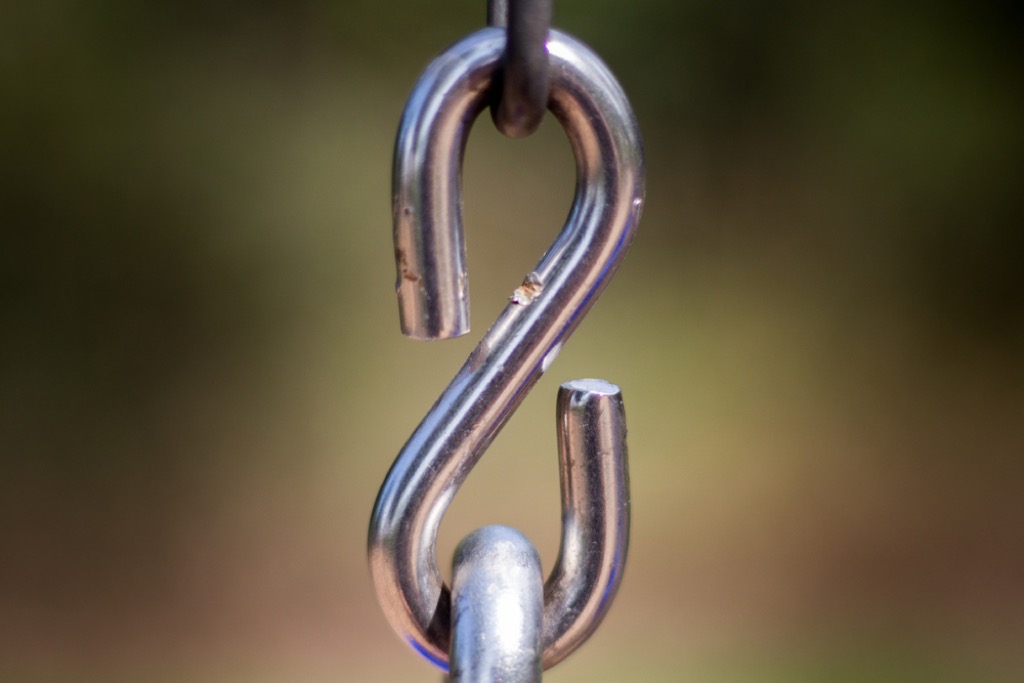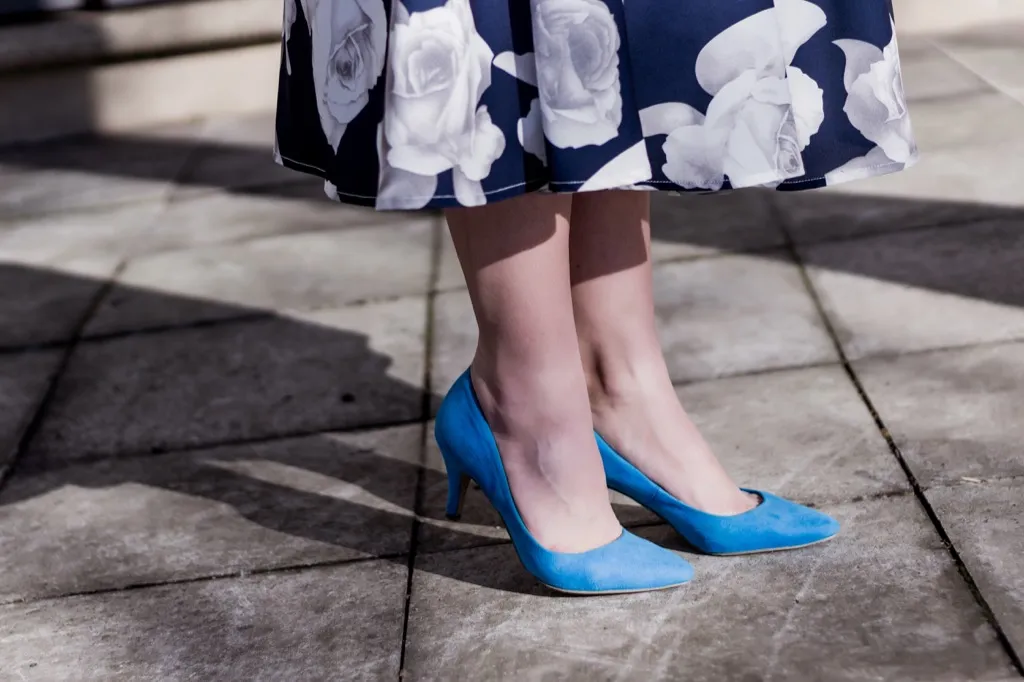55 Everyday Sayings Everyone Gets Wrong
"For all intensive purposes," we live in a "doggy dog world."
Sure, your grammar might be impeccable, and you might even be able to spell difficult words like liaison and supersede without looking them up, but chances are there are still some commonly misused phrases you're guilting of messing up every now and then. From describing a qualified person as a "shoe-in" candidate to telling someone that you "could care less," here are X of the most commonly misused phrases that might have just slipped under your radar.
READ THIS NEXT: The 60 Most Beautiful Words in the English Language—And How to Use Them.
55 Commonly Misused Phrases
1. "Hunger pains"

Though it's entirely possible to experience hunger-related pain, the standard English phrase for that churning feeling in your belly is "hunger pang." Sure, people will know what you're talking about when you say "hunger pain," but you'll sound much more informed using the proper phrase.
2. "Escape goat"

The only time you should ever use "escape goat" in a sentence is if you're at the zoo and one of the goats gets loose. But if you want to refer to someone who's being blamed for other people's wrongdoings, that's a scapegoat.
3. "Ex-patriot"

An expatriate, or an ex-pat, is a person who temporarily lives in a country other than the one in which they were born. An ex-patriot, on the other hand, would be someone who used to really love their home country but changed their mind after learning some deep, dark government secret. That probably applies more to Jason Bourne than your cousin who got a job in Ottawa.
4. "Pass mustard"

If someone is passing the mustard, it's because they think your hot dog looks woefully underdressed. If something passes muster, that just means it's satisfactory. In addition to sounding similar, the confusion here likely stems from the similarity between "pass muster" and "cut the mustard," both of which can be used to indicate adequacy.
5. "Biting my time"

When you think about it, it sounds kind of strange to say that you're "biting" your time, doesn't it? Well, that's because it is strange—and it doesn't make sense. If you're trying to say that you're waiting for something, then what you're trying to say is that you're biding your time, not biting it.
6. "First-come, first-serve"

The last thing you'd ever want to hear is "first-come, first-serve." Why? The way this phrase is written implies that the first person who arrives to a certain restaurant or party is also the one who has to serve all of the other guests! The correct way to say this phrase—so as to avoid unexpectedly becoming a server—would be "first-come, first-served."
7. "Piece of mind"

When someone says that something is giving them "peace of mind," they're saying that they feel safe and secure. But when they have piece of mind? Well, we can only assume that they're in the middle of brain surgery and are cradling a chunk of cranium.
8. "Make due"

The only person who can really "make" something "due" is a teacher with a homework assignment. The rest of us, on the other hand, will have to make do with making do.
9. "By in large"

Admittedly, neither "by in large" nor "by and large" makes much sense. Regardless, only the latter phrase is the correct way to say "in general." According to Merriam-Webster, this phrase originated as a sailing term meaning "alternately close-hauled and not close-hauled."
In nautical speak, the word by refers to being in the direction of something—as in, "That boat is by the wind." The word large describes an instance in which the wind is blowing in a way that allows sailors "to maintain their direction of travel anywhere in a wide arc without needing to make continual changes to the set of the sails," World Wide Words explains.
But if this is going over your head, don't worry: The short of it is, you should be using "by and large."
10. "Do diligence"

Think about this one for a second. How do you do diligence? The only thing you can do, really, is your due diligence—meaning you're taking reasonable steps to satisfy a requirement.
READ THIS NEXT: 60 Words People Pronounce Differently Across the U.S.
11. "I could care less"

When people say "I could care less," they are unknowingly saying the opposite of what they generally mean. In using this phrase, they're saying that they care a certain amount about the subject in question, but it's possible for them to care even less. The correct version of this common saying is "I couldn't care less," meaning they don't care at all.
12. "Doggy dog world"

Add a second G to the word dog and you've got the title of an early '90s Snoop Dogg track. In any other scenario, though, the phrase "doggy dog world" doesn't make much sense. It's actually "dog-eat-dog world," meaning it's highly competitive.
13. "Irregardless"

Regardless of how much slang slips into your vocabulary, don't use the word irregardless under any circumstance. Regardless is a word. This permutation, sadly, is not.
14. "Nip it in the butt"

While "nip in the butt" might conjure adorable images of a puppy playfully biting the Coppertone girl's posterior, the correct phrase to use when talking about halting something in process is "nip in the bud." It refers to the keeping of plants—particularly the idea that, when trimmed or harmed at an early age, a flower won't grow.
15. "Could of"

So, you could have used "could have," but chose "could of" instead. While "could have" indicates that something was possible—you could have gone swimming but chose to stay inside instead, for example— "could of" doesn't really make any logical sense.
The error tends to stem from the pronunciation of the contraction "could've," which is phonically indistinguishable from "could of."
16. "Butt naked"

If you're fully naked, your bottom is probably exposed—and that's likely the reason so many people misuse this phrase. The correct expression, however, is "buck naked." Buck refers to a man, or, according to Washington State University professor Paul Brians, it may also have roots in the early American slave trade, where it was used as a derogatory term against Black men.
17. "You've got another thing coming"

The phrase "you've got another thing coming" seems to make sense: You assume one thing, but you'll turn out to be incorrect. However, the original usage was "you've got another think coming," meaning another thought or belief will soon replace the one you currently hold true.
18. "Do a 360"

If you go 360 degrees around a circle, you've traveled a long distance, which may be why some people assume that this phrase makes sense. However, traveling 360 degrees leaves you right where you started.
Going 180 degrees, however, leaves you as far from your starting point as possible. Hence, the phrase is "do a 180" and not "do a 360."
19. "Worse comes to worse"

According to the New York Times, the first known iteration of this phrase was "worst come to the worst," published in 1596. It indicated a hypothetical worst-case scenario turning into a real-life worst-case scenario.
However, the phrase has evolved over time, and today "worse comes to worst" is more commonly used to indicate the possibility of a bad situation becoming a terrible one.
20. "For all intensive purposes"

When people say "for all intents and purpose," it certainly sounds similar to "for all intensive purposes." And hey, the latter almost makes sense: If your purposes are intensive, they're highly focused. That said, the correct usage is "for all intents and purposes," meaning "in a practical sense."
For more language content sent straight to your inbox, sign up for our daily newsletter.
21. "Wet your appetite"

What would it mean if one's appetite were wet, exactly? The phrase you're looking for here is "whet your appetite," with the word whet being an antiquated way of saying that something incites interest.
22. "Unphased"

Though the two are homophones, the word unfazed is what you're looking for, not unphased. To "faze" means to disturb—so if you're unfazed by something, it doesn't cause you much trouble.
23. "One in the same"

If what you're trying to say is that two things are the same, then the phrase you're looking for is "one and the same," not "one in the same." While "one in the same" seems like it makes sense, you'll definitely get an earful if you use it in a formal setting amongst logophiles.
24. "Worse-case scenario"

It might seem reasonable that you're preparing for a "worse-case scenario"—a time when things get significantly worse than they are at the present. What you should prepare for instead, however, is a "worst-case scenario," the correct phrase, which refers to a time when things get insurmountably bad.
25. "Honing in"

While "honing" sounds like the correct usage here—meaning "sharpening a skill"—the correct phrase is "homing in." Like a homing missile, "to home" means "to get closer to," in either a figurative or a literal sense.
26. "Jive with"

If you're jiving with someone, you're dancing together. If you're jibing with them, you're getting along, or you find yourself generally in agreement with them. Chances are, you mean the latter.
27. "Baited breath"

Although baited may seem to make sense here, the correct phrase, in this case, is bated breath. The former refers to being taunted, while the latter means to reduce the intensity of something. It indicates that you're exercising restraint over something you're excited about.
28. "Spitting image"

While "spitting image" is the form of the phrase most commonly used today, its original incarnation is "spit and image."
It's believed to stem from a 16th-century text in which an author refers to similarities between parent and child appearing as though the latter was spit from the former's mouth. However, many scholars also believe it is Biblical in origin, and that it refers to God's creation of Adam.
29. "Statue of limitations"

Unless there's a stone sculpture with a list of won't's somewhere, "statue of limitations" doesn't make a lot of sense. It's actually "statute of limitations," meaning a law that describes the limited timeframe in which legal measures can be taken.
30. "Pour over"

If you're making a cup of coffee, it might be a pour-over. If you're carefully inspecting something, you're poring over it. Pore, in this case, means to intently study or reflect upon something.
READ THIS NEXT: Tongue Twisters So Good, Your Mouth May Never Be the Same.
31. "Case and point"

When you win a chess match, you might boastfully utter, "Check and mate" to the losing player. When you're trying to provide an example of something, the similarly-constructed "case and point" is incorrect, however; the correct phrase is "case in point."
32. "Deep-seeded"

If something's deep-seeded, it must mean that it's deeply embedded like a seed in soil, right? Well, not exactly. The correct phrase is "deep-seated," meaning something is firmly established or hidden below the surface.
33. "On tender hooks"

We're not sure what kind of hook could be described as tender, per se, so it stands to reason that "on tender hooks," while commonly used, is not actually correct. Instead, the phrase is "on tenterhooks," describing the hooks used to stretch wool on a frame, leaving it in a fragile state.
34. "Free reign"

While this phrase sounds as though it's about a monarch, the correct version is actually a reference to horses. Giving "free rein" means to allow a horse—or, metaphorically, a person—to determine its own path, having loosened its reins.
35. "Extract revenge"

If you're getting revenge, it would make sense that you're extracting it from the object of your enmity. However, the correct phrase here is "exact revenge." To exact, in this case, means to demand revenge from the person who's wronged you.
36. "On accident"

Though some will claim that this is simply a regional variation, technically, the correct usage is "by accident." Of course, this is particularly confusing, seeing as the generally-accepted opposite of the phrase is "on purpose."
37. "Waiting on someone"

Unless you're working at a restaurant or bar, you likely don't spend any of your time waiting on someone. Instead, you spend your time waiting for someone.
38. "Slight of hand"

Though "slight of hand" and "sleight of hand" are homophones, they don't mean the same thing. "Slight" can describe something small or an insult, whereas "sleight" describes a form of trickery, as in "sleight of hand magic."
39. "Peak my interest"

It certainly seems like the word peak makes sense here—"peak my interest" sounds as though it means "to heighten interest," after all. However, "pique my interest" is the correct phrase, and it means "to stimulate."
40. "Pawned off"

If you don't want your old wedding ring, you might take it to a pawn shop—so it's logical to think that you'd similarly "pawn off" a project you don't enjoy on a coworker. However, the correct phrase is "palmed off," meaning to trick someone.
READ THIS NEXT: 70 English Idioms That'll Help You Become Fluent in No Time.
41. "Mano a mano"

If you aren't fluent in another tongue, you'll likely run into trouble when attempting to use its idiomatic language. Case in point: Many people use the phrase "mano a mano," assuming it means "man to man," when it, in fact, means "hand-to-hand," and is generally a reference to fighting.
Yeah, this is probably not what your friend means when he wants to ask you something "mano a mano."
42. "Sneak peak"

If you're getting a glimpse at something before others do, that's a sneak peek, as in "an early look." A peak, on the other hand, refers to the top of a mountain.
43. "Scott free"

Sorry, folks, but we're not letting you off scot-free if you're one of the many people who use this phrase incorrectly. Unless you're describing a place with no guys named Scott in it, the phrase you're probably looking for is "scot-free," meaning unpunished or unharmed.
44. "Shoe-in"

If you have a foot in the door for a job, it stands to reason that you'd be a "shoe-in" for the position, right? Not quite. In fact, the phrase is "shoo-in," meaning something easily ushered in.
45. "Beckon call"

"To beckon" means to summon someone or something, which is likely the reason so many people misuse the phrase "beck and call." It refers to being available at someone's command. Confusingly, though, the word "beck" and the word "beckon" are related—so if you've been saying this wrong, don't beat yourself up about it.
46. "Take a different track"

If you're not particularly familiar with nautical slang, then you've probably been making this error with some frequency. In fact, the correct phrase for taking a different approach is "take a different tack," with a tack describing whether the wind is hitting the port or starboard side of a sailboat.
47. "Have your cake and eat it, too"

Many people will use the phrase "have your cake and eat it too" to describe getting multiple things they wanted at once. But the preferred use of the phrase is "you can't have your cake and eat it, too," meaning that the two things in question are mutually exclusive, like both having a cake in your kitchen and getting to eat all of it would be.
48. "A mute point"

It seems relatively logical that a "mute point"—something that's so inconsequential as to be completely silenced—would be the proper use of this phrase. However, it's actually a moot point, meaning that it's debatable.
49. "Fall by the waste side"

Sure, something can technically fall by the waste side if you intend to throw it into the trash can and it lands instead right next to it. However, if what you're trying to say is that something or someone has failed to keep up in a particular endeavor, then what you're trying to say is that they've fallen by the wayside.
50. "Chock it up"

The word chock has numerous meanings in the English language, but none of them mean "to credit something." However, that's exactly what chalk can mean in this context—hence the correct phrase is "chalk it up."
51. "Tongue and cheek"

If you've injured your mouth area, it might make sense to say you're having issues with your "tongue and cheek." But if you're trying to tell someone that the serious-sounding statement you just made was actually sarcastic or sassy (or, shall we say, cheeky), then you want to say "tongue in cheek."
According to Grammarist, this phrase was first used in the 1880s, as "placing your tongue inside your cheek was a physical gesture indicating insincerity or playfulness."
52. "In regard to"

With regard to this phrase, "in regard to" is incorrect. If you're trying to say something is referencing or concerning something else, the correct usage is either "with regard to" or "as regards."
53. "Flush out"

We're sorry if you've actually had to "flush out" your toilet, but when describing the process of expanding upon an idea or adding more details to a story, you should be saying "flesh out."
54. "Chomping at the bit"

Just because everyone says "chomping at the bit"—when trying to reference eagerness or restlessness to do something—doesn't mean it's correct: It's actually "chomping at the bit."
As NPR explains, "It comes from something said about horses when they bite their bits 'repeatedly and restlessly.' They 'champ.'"
55. "Use to"

You "use to" play tennis? No, you "used to" play tennis.
According to Merriam-Webster, "Used to refers to something familiar or routine, as in 'I'm used to getting up early for work,' or to say that something repeatedly happened in the past like 'we used to go out more.'"






















